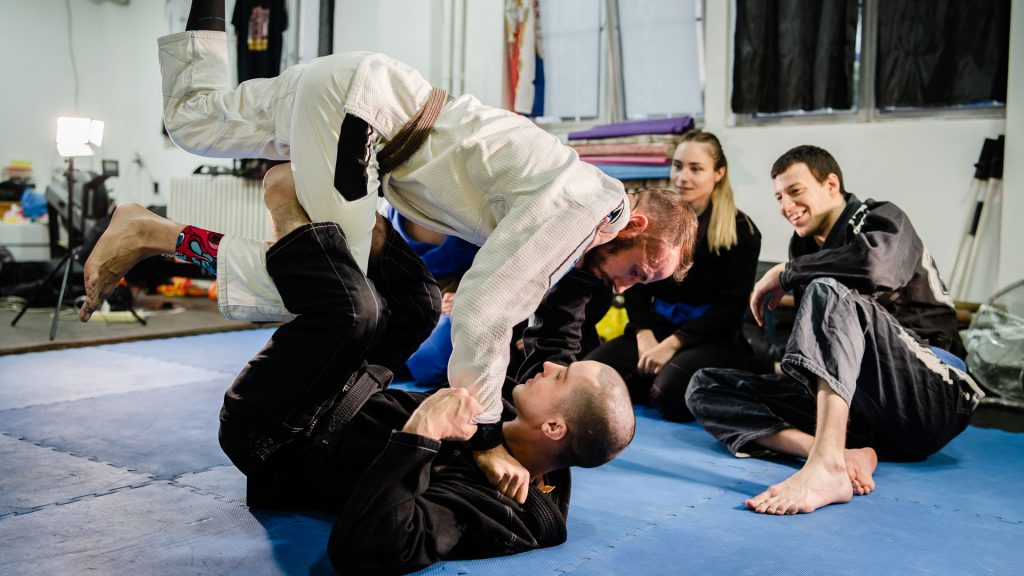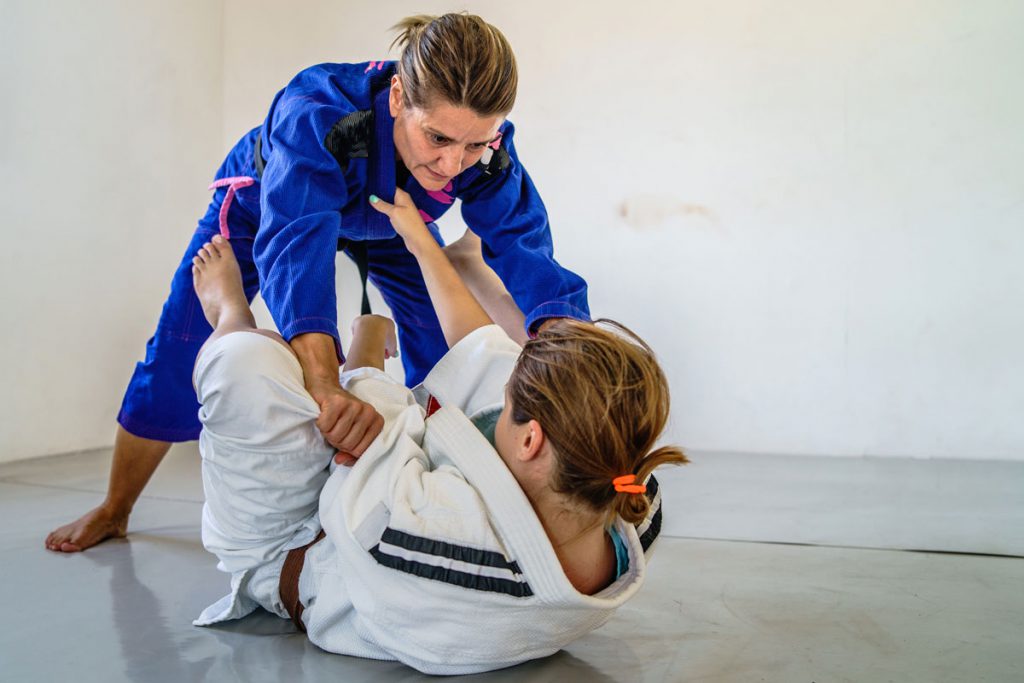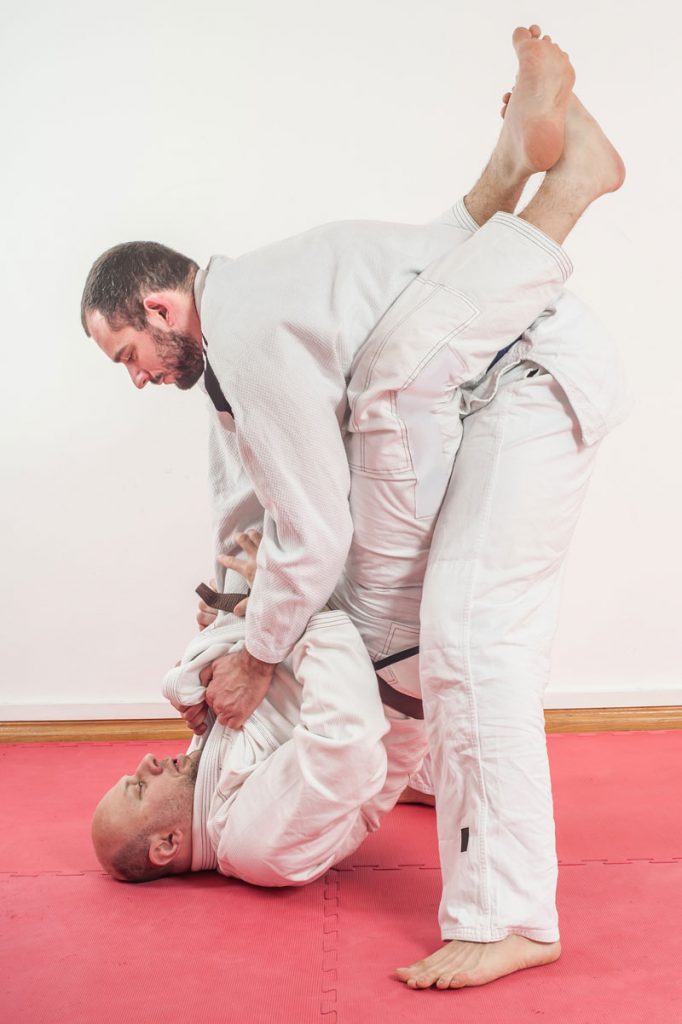Below you’ll find answers to questions which might arise before starting Jiu-Jitsu in your forties. For starters I’d like to point out that I’m in the same age category. Albeit not a total beginner, but in terms of my Jiu-Jitsu career, just a blue belt freshmen. I’ve also had many layoffs due to moving to different countries and other unexpectancies life has thrown at me. So for the most part these pointers are drawn from my own experience.
And so is rest of the this blog, in some form or another, my own experiences and questions I’ve had to deal with. I’m here to help you figure out whether starting BJJ in your forties is OK and suitable for you. Below you’ll find answered some of the main questions and concerns that usually come up when starting a Jiu-Jitsu class in your 40’s or even later.
Table of Contents
Am I Too Old For Jiu-jitsu?
Simple and short answer to this main question is “NO”, of course you’re not. The only thing you need to concern yourself with, is showing up the first time. More what to expect your first BJJ class here.
There are no age limits when it comes to Jiu-Jitsu and you can even compete, should you wish to do so later. There even used to be a world class tournament “Master And Seniors International Jiu-Jitsu Championship” where the upper contestant age groups were 56 years and older. It’s discontinued at the moment, but most Jiu-Jitsu tournaments have a seniors age group.
Most Jiu-jitsu Clubs Have Many Attendees In Their 30s.
Most of the clubs I visited have many students who are over 30 and let’s be honest, do you feel older than 30? You wouldn’t be searching for Jiu-Jitsu information if you were. That being said, you’ll fit right in. I know I have. Also there are some Jiu-Jitsu schools which offer +30s classes. So do your research beforehand and you might find a club just like this nearby. Another good reason to maybe do a little homework is that you don’t stumble upon a club that’s orientated towards competition. Although it’s rare, they do exist.
A Rickson Gracie quote: “Jiu-Jitsu is for life. Whether you like to compete or not, the most important thing is to be able to train and have fun. “
Do I Need A Certain Level Of Fitness To Start Bjj?
Again, simple answer is “NO”, you do not! And there are no ifs or buts about this. It’s quite the opposite in my opinion. It will only give you more incentives to show for classes if you have multiple reasons for doing so. Whether it’s getting into shape, which by the way BJJ is perfect for or you just want to learn self-defense. Either way you will benefit from both.
I used to weigh about 215lbs before I started my first Jiu-Jitsu class. I’m now walking around and fluctuating at about 190 lbs, depending on whether or not it’s holiday season. While this might not seem like much to bystanders, I also feel 10 years younger due to fitness. And I’ve seen many, many more people besides myself who have totally transformed their lives due to Jiu-Jitsu.
Do I Have The Time And Energy?
There is no rush when it comes to your Jiu-Jitsu schedule. Whether it’s juggling multiple jobs or having a large family to take care of – everyone has their own rhythm going and it’s totally fine to start out just once or twice a week. No one is judging, besides yourself.
Even though most larger schools have classes every day, you should not feel obligated to attend every single one. And it’s probably best you don’t. As the burn out phase can be real and I’m speaking from experience here. This of course is subjective and can be totally different for you. Just keep in mind that this does exist and no point in overdoing it. It’s not a race, it’s a marathon.
Depending on your schedule you might want to look for BJJ gyms that offer morning classes. Most gyms I’ve been to, have a very early class in their schedule. Few times a week just for that purpose of accommodating the people with tighter schedules in the evening. It’s a great way to start a day and give you a boost for the whole day. Albeit the morning routine change can be a nuisance for sure for those of us who have a tendency to stay up or work late.
Once you get over the initial “I feel like I’m drowning” phase, Jiu-Jitsu becomes an addiction and you will most definitely find the time and energy more easily than in the beginning.
Will I Get Injured?
This question has been probably been floating around your mind as well. Since at the end of the day we’re dealing with a combat sport. But It must be stressed right away that even tho BJJ is a combat sport, it does not automatically mean you will get pummeled in a Jiu-Jitsu class. Just as you might slip on a banana peel, you might get an occasional bruise here and there which in all honesty will feel like an accomplishment rather than something to feel bad about. There are also a few pointers below which might help you keep from getting bruised or injured. The benefits outweigh the minor risks in Jiu-Jitsu for sure.
Do I Need To Spar (Roll) Right Away?
While rolling might sound like a daunting task for the beginner, it’s nothing to be feared. There is absolutely no rule that says you have to spar. People are different and everyone has their own pace at which they will progress to sparring. So by no means, you don’t need to roll right away. No one is going to judge you, if at the end of the class you ask your Professor (aka coach) to skip the rolling session. In my first gym, coach was adamant about people into their first few sessions not rolling. Besides, not all schools roll from the first class anyway and have a totally different, basic BJJ course approach. More on what to expect from sparring here.

Basic course is a step by step mostly fitness based course, where you get your first introduction to Jiu-Jitsu movements and positions. In addition to you’ll be paired with someone to drill basic BJJ positions and depending on the gym some easier submissions. Most likely scenario is you’ll also be practicing something called isolation sparring. It’s where you are put into a certain position with a partner and you can only perform a limited amount of moves. I guess a better way of describing it is, it’s more of an intense drill than sparring. This approach minimizes any injuries due to lack of sparring and is a safe way to test out whether BJJ is something for you. More on BJJ and safety here.
And because BJJ is very different to any other sport, expect to be a little sore afterwards, regardless of your fitness level. You’ll be using muscles which you didn’t even know existed until your first few Jiu-Jitsu classes.
If you live in a bigger city or have the luxury to choose from multiple Jiu-Jitsu schools, it’s advisable to check out the curriculum before you attend your first class.
Do I Have What It Takes Mentally?
This one is a bit tougher to answer as people are very different and Jiu-Jitsu is definitely going to take a certain level of commitment. Other than that, there’s nothing to it, really. As mentioned earlier, the main thing is to just keep showing up and the rest will take care of itself. This would probably be one of the more important mental notes to take from all this – just keep showing up!
BJJ has a very high level of drop out rate in beginning as people are expecting fast results, which unfortunately is not how it works with Jiu-Jitsu. By various estimates it’s been said that about 90% of people who start Jiu-Jitsu will move on to other adventures before they reach blue belt level. So be ready for a little mental battle with yourself when you first start out.
Fun little example, I went through two basic BJJ courses before getting into the groove. First time, I tried to skip the basic course as I came from another martial art (Hokutoryu Ju-Jutsu) and figured, “this will be a piece of cake” – turns out, it was not the case at all. Not even close. Showed up to advanced class, Professor had me rolling with someone who armbarred me in 20 seconds. Needless to say, I was told to beat it. Well OK, not beat it, but politely told to go attend their BJJ basics class next time. Humbling experience for sure. After finishing the BJJ basics course, life had other plans and my schedule unfortunately did not allow for any more Jiu-Jitsu. Although this stage was not too long, more or less about a year and a half, when I got the opportunity to start my Jiu-Jitsu journey again, I was much wiser and attended the basic course of my own will.
Humbling experiences will be the theme of not only yours but everyone’s Jiu-Jitsu career. There will always, always be someone quicker with better technique, more powerful and so on. But, this is also the part where Jiu-Jitsu makes you a better person overall. More on the topic of humbling experiences and being a better person thanks to Jiu-Jitsu here.
Is Jiu-jitsu Good For Weight Loss?
Jiu-Jitsu is an excellent tool which can help you get into shape as even the warm-up alone is pretty intense if you’ve never done any physical activity or are a little out of shape. However, you’ll find this painful stage will quickly subside after a few weeks or so when your muscles have gotten used to these new movements. So the answer is most definitely: “yes, you will lose weight.”
One of the better and also easier goals to set for your Jiu-Jitsu journey in the beginning is to just take it as a physical activity without putting too much weight on the “getting good, fast” mentality. Which is of course not to say that you shouldn’t be doing your best when attending classes, but just remind yourself that there are other added benefits to your being there besides learning Jiu-Jitsu. Set out with smaller goals (more on the topic of BJJ goals here) alongside learning actual BJJ. This will definitely keep you from getting bored or quitting altogether.
In Conclusion
If you’re on the fence about how you feel about BJJ. Do your homework and find a Jiu-Jitsu gym which offers a Jiu-Jitsu basics/introduction course or something similar. This way you can ease into the process more easily. And get the needed confidence for moving onto light rolling phase of BJJ. And of course if you’re already have some other martial arts experience in the earlier part of life, or just have the mind set for it, jump right in – I bet you’ll like it!
Should you have any helpful additions of your own to this list, please let me know in the comment section. We might just help someone out with similar concerns or questions and help grow our Jiu-Jitsu community.


